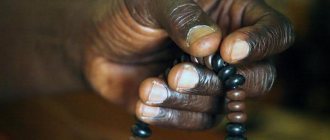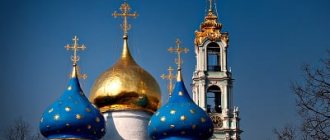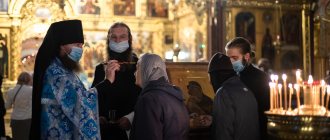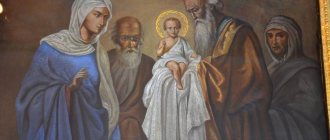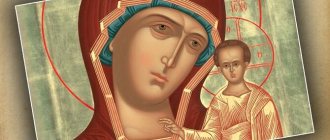Why does the real life of Orthodox Christians look more like a theater of the absurd than an example of Christian piety? Hierodeacon John (Kurmoyarov) is sorting it out.
According to statistics, more than 80% of Ukrainians consider themselves believers belonging to the Orthodox Church. Why is it that a country in which the overwhelming majority of Orthodox Christians ranks first in the world in terms of corruption, the number of divorces, abortions and many other negative phenomena of social life?
Recently, while walking around Kyiv, a middle-aged woman approached me and stunned me with the following question. “Father,” she wondered, “why is it so difficult for people to find a common language among themselves? After the Maidan, we decided to create a housing partnership in our neighborhood to jointly solve housing and communal services problems. But as a result, nothing came of this venture. Everyone quarreled and went home. But we all wanted to do what was best?” — “Didn’t you think that throughout the history of mankind people have done nothing but provoke violence, wars, revolutions, etc., in their attempts to create heaven on earth? Have you not thought that even with our family and friends we often cannot live in peace and harmony, which gives rise to quarrels, resentments, misunderstandings, etc.?” - “What is the reason? What prevents people from understanding and hearing each other?” my interlocutor asked. I said that the reason for this sad state of affairs lies in human passions. “And that’s all?” - she was surprised. “Isn’t that enough?” I asked. “Is there any mechanism to combat this?” my interlocutor asked.
A mechanism for solving problems in life that most people don’t like
And here I made the mistake that I repeat again and again in conversations with people when they come up on the street and ask me how to solve certain problems in their lives. I said that there is a mechanism and that it is very simple - life according to the commandments of the Gospel in the Church. Here's the mechanism.
After these words, the woman immediately lost interest in the conversation and left without saying goodbye. I admit, this reaction was not surprising to me. I completely understand this woman and other people who behave this way after being given a similar answer. Yes, I myself would have behaved in the same way before joining the church - and do you know why? Yes, because people expect a completely different answer from a clergyman. Often, after you invite a person to pick up the Gospel and try to live according to its commandments, they look at you, at best, as a heretic who does not understand anything about the true faith, and at worst, as a provocateur.
In fact, people expect from us that you will advise them to pray in front of a miraculous icon, bathe in a spring, light a candle to a saint, read some long “strong” prayer, serve a prayer service, go somewhere on a pilgrimage, etc. . They are waiting for advice from you, just as they are waiting for a pill from a doctor that will relieve their pain: they take a pill and feel better, light a candle and their son goes to college, etc. And none of our arguments in favor of the fact that such a pill does not exist in nature, that if such a pill existed, then we would all have long ago lived in heaven on earth, do not work, and our words bounce off the ears of listeners like peas from a wall .
Which pagan holidays in Rus' became Christian?
Since the exact dates of this or that Christian holiday were not reliably known, they were easily changed. As mentioned above, the pagan holiday Kupala or the day of the god Kupala became the day of John the Baptist. However, they quickly began to call him Ivan Kupala. Despite converting to Christianity, many Slavs continued to look for the fern flower and swim naked in the river.
Pagan holidays such as Christmastide and Triglav also found their place in Orthodoxy. For example, Christmas cheerful festivities were transformed into glorifications. Children and older guys began to go from house to house and glorify not God Kolyada, but Christ. But the name of the songs - carols - remained unchanged. The holiday of Triglav turned into the holiday of the Holy Trinity. And it preserved the pagan tradition of decorating houses with tree branches and flowers.
"The night before the holiday of Kupala." V. Ivanov
What advice do people really expect from a priest?
Actually, they expect this not from us, the clergy, but from God. And we just have to tell you how to do it correctly, where to put candles, where to cross yourself, where to bow, etc. For such people, God is exactly like you and me - a passionate being, and therefore we are completely dependent on His whims and moods. Who wants to fall out of favor with the Heavenly King? Naturally, no one. So we please Him, just as we would please an earthly king if we were to fall out of favor and suffer. In the same way, by the way, we please officials, bosses, and those in power. We pay bribes, try to get a position and, in general, get the best life possible. And it even seems to us that exactly the same laws and rules apply in the “office” of the Heavenly King.
In theological language, this phenomenon is called “anthropomorphism” * - this is a situation when we transfer our passionate, earthly ideas to the realm of the Divine presence, and we liken God Himself to a being endowed with power like an earthly king or khan. According to the apt remark of the Apostle Paul, in this case we serve the creature instead of the Creator. Actually, this is the essence of paganism - to serve the creature instead of the Creator! So the “white magic of the Orthodox rite” is paganism in an Orthodox wrapper. This is a situation where secondary, ritual things come to the fore, and the very essence of the Christian faith is completely ignored. Try to tell people with similar ideas about Orthodoxy that God does not punish anyone, that people themselves punish themselves with passions and sins, that the apparent punishments of God are actually good and a manifestation of God’s love for man, quote St. Anthony the Great: “God is good and does only good; harming no one harms anyone, being always the same” - and you will be considered an ignoramus who knows nothing about spiritual matters. Or try writing on Facebook that the Church of Christ cannot serve anything corruptible, temporary, or transitory (neither Ukraine, nor Russia, nor the European Union), that a Christian cannot be a nationalist, and that the highest value for a Christian can only be Christ and His Holy One Church. And you will immediately be listed as “enemies of the Ukrainian people” and “servants of the Kremlin.”
What problems did Christian priests face in Rus'?
With the advent of Christianity in Rus', the people encountered some difficulties. The folk Slavic calendar did not coincide with the calendar from the Nativity of Christ. The new church calendar began to be adjusted to the folk one. They began to ban some holidays and postpone others. So, the day of Kupala began to be called the day of John the Baptist, and the day of Triglav became Trinity. But this only made it worse.
There were riots among the people, so Ivan III had to legalize dual faith. The church calendar began to be considered official, and the old one was used by the people. It turned out that pagan and Christian holidays merged. Many holidays of pagan gods celebrated in the fall became spas. And, for example, spring ones were grouped around Easter. The dates of worship of minor gods became the same as the patronal holidays.
The rituals that were popular among the people on pre-Christian holidays could not be completely eradicated. The priests understood that the Russians, accustomed to celebrating holidays on a grand scale, could not quickly adapt. Of course, monotonous services and prayers could not be compared with pagan festivities. Therefore, many elements of ancient Russian customs were included in Orthodox holidays.
If you please God, will life get better?
And indeed, a pagan does not need all this and does not understand it. The pagan firmly believes that if you please God, life will improve and problems will be solved. That is why they go to church in search of some kind of magical ritual, formula, prayer mantra, the implementation or reading of which guarantees one hundred percent success.
The pagan does not care about the fact that magism in the Church, first of all, distorts the relationship between man and God, distorts the very thought of God, because the magical point of view is built on the basis that God only needs a ritual that is performed correctly and on time; Otherwise, man does not owe God anything, and the relationship between man and God is completely exhausted by this. Moreover, these relationships themselves are built on such human vices as hypocrisy and people-pleasing, which gives rise to the corresponding spirituality, and with it the paradoxes of our society, when in a country with 80% of Orthodox people, bribery and intolerance towards each other flourishes.
And yet, in a sense, the pagans can be understood, because. very often it is not always easy and comfortable for a person to be with Christ. He commands: You shall love the Lord your God with all your heart, and with all your soul, and with all your mind, and with all your strength - this is the first commandment (Mark 12:30). This requires moral tension from a person, aspiration of the heart to the Lord, and for people this is inconvenient, boring and uninteresting: “They need,” writes St. Ignatius Brianchaninov - effect and entertainment; therefore, Christianity is “colored” with a wide variety of things, such as: visions, signs, revelations; trips in search of visionary elders and oxbows; veneration of various sources and other “shrines”; calculating signs of the imminent end of the world; the creation of a huge number of legends about certain revered saints, etc. Paganism is often mixed in here, clothed in church clothes, for example, the veneration of Honey, Apple and other “Spas”, Maslenitsa, various kinds of semi-superstitious customs associated with the holidays of Christmas and Epiphany, and so on. The danger here is that the teaching of the Church is not the Holy Scripture, not the dogmatic and moral patristic Tradition, but historically flawed information and old women’s fables (1 Tim. 4:7).”
Our fault is in the ritualism and magic of “Orthodox Ukrainians”
But the most offensive thing is that to some extent we ourselves are to blame for the current situation. We must admit to ourselves: missionary work is not the strongest side of the Church, and our hope that the majority of those people whom we have baptized all these years will come to the Church and begin to consciously confess Christ has not been justified. And I admit, I don’t know what to do with all this now. Although in fairness it should be noted that this has already happened more than once in the history of mankind. For example, listen to the words of St. John Chrysostom and tell me: does this remind you of anything?
“...I see,” the saint writes, “that many after baptism live more carelessly than those who have not been baptized, and do not even have any sign of Christian life. That is why, neither in the market place nor in the Church, you can quickly discern who is a believer and who is an unbeliever; unless, when performing the sacraments, you can see that some are expelled, while others remain in the temple. Meanwhile, one should differ not in place, but in character. External virtues are usually recognized by external signs, but our virtues must be recognized by our soul. The believer must be seen not only by the gift, but also by the new life. A believer must be a lamp to the world and salt. And if you don’t shine for yourself, don’t prevent your own rottenness, then why should we recognize you? Is it because you immersed yourself in sacred waters? But this may get you punished. The greatness of the honor for those who do not want to live according to this honor increases the penalty...
So, tell me, why can I know that you are faithful, when everything I have calculated assures me otherwise? And what do I say - faithful? I can’t even find out for sure whether you’re a human being. When you kick like a donkey; you gallop like an ox; you neigh at women like a horse; you overeat like a bear; you make your flesh fat like a mule; vindictive as a camel; predatory like a wolf; angry like a snake; sarcastic like a scorpion; cunning like a fox; you keep the poison of malice within yourself, like an asp and a viper; You are at enmity with your brothers like a crafty demon - how can I consider you a human being without seeing in you signs of human nature? Looking for the difference between the catechumen and the faithful, I run the risk of not finding the difference even between man and beast. How can I really call you a beast? After all, every animal has one of these defects. And you, having accumulated all the vices in yourself, far surpass them with your foolishness. Shall I call you a demon? But the demon does not serve the torment of the womb, and does not love money. And when you have more vices than animals and demons, tell me, how can you be called a human? If we cannot call you a man, then how can we call you faithful? And what’s saddest of all is that, being in such a bad state, we don’t even think about the ugliness of our soul, we have no idea about its vileness. When you sit at the barber's and cut your hair, then, taking a mirror, examine the hairstyle with all attention, ask those standing nearby and the one who cut your hair, do they lie well on your forehead? Being an old man, you are often not ashamed to indulge in youthful dreams to the point of fury. But we don’t feel at all that our soul is not only ugly, but even bestial-like, and has become the scylla or chimera mentioned in pagan fables...”
Christianity and paganism
Estimated reading time: 4 minutes.
Sergey KHUDIEV
Attempts to introduce mandatory conversations about the foundations of the Orthodox Faith before Baptism caused irritated bewilderment among many people. However, as I heard from one conscientious priest, attempts to instruct the parents or godparents of a newly enlightened baby in the faith have caused irritation before - “Why is dad acting weird? The food on our tables is getting cold, let him baptize and we’ll go.”
People do not understand at all what Baptism is - and do not strive to understand; however, it is difficult to reproach them for this, no one taught them the Fundamentals of Orthodox Culture - what grew in an abandoned wasteland is what grew. And what always grows has grown - paganism. Baptism is perceived partly as a magical act (so that the child does not get sick), partly as an initiation that introduces the newborn into the national community, “Russian means Orthodox.”
The trouble is that paganism is omnivorous - and it perfectly assimilates certain ritual elements of churchliness, while remaining paganism. Somewhere in Leskov there is a story about how simple-minded local residents, having received an icon of St. Nicholas began to smear her with sacrificial blood to show respect to the “white god.”
But what is paganism and how does it differ from Christianity? One could say that Christians recognize one God, while pagans have many gods. But this is not entirely true - pagans can recognize (and many recognize) God the creator. Paganism is distinguished rather by its attitude towards God. These relationships are partial, while for a Christian they are total. Let's explain this in more detail.
In paganism, the deity solves some of my problems, I give the deity some respect; to be religious in this regard means to add another element to other elements of your life (work, family, hobbies) - religion. It's like having a relationship with an ambulance that I don't need most of the time, but that I want to make sure is ready to respond to when I need it. Or a relationship with someone in power - I have a treasured phone number, I can use it, but I understand that it’s better not to bother me.
The Christian's relationship with God is all-encompassing, total. Believing in God does not mean adding another element to your life. This means rebuilding it on a completely different basis. Everything - family, work, hobbies - must be in obedience to God. This is not an upgraded life - this is a completely new life. A life in which a Christian completely surrenders himself to God, and does not call upon Him to solve some of his problems.
Paganism is open - it is, as they say now, inclusive. For a pagan, there is no problem in worshiping various gods, resorting to a variety of spiritual practices - praying in a church, then in a mosque, then practicing shamanism. As Lyapis Trubetskoy sang, “I believe in Jesus Christ, I believe in Gautama Buddha, I believe in the prophet Mohammed, I believe in Krishna, I believe in Garuda.” If you do not give your life completely, but simply enter into a relationship “I - you, you - me,” then the number of partners is unlimited, and limiting them is as strange as limiting the number of sellers from whom you purchase goods and services.
The ancient mysteries might have been somewhat reminiscent of earlier Christianity, but what immediately caught your eye was that you could be initiated into the mysteries of various deities - the more, the better - while the Church demanded that you refuse to venerate anyone, except the God and Father of our Lord Jesus Christ. Christianity is exclusive - it is not like a deal, but like a marriage. This image is often found in the New Testament, along with other images - citizenship or military service. Christianity does not recognize dual citizenship - to be a Christian, you must unconditionally renounce any non-Christian beliefs and spiritual practices. No fortune telling, no calling on spirits, no “karma diagnosis”.
Another aspect of paganism is its this-worldliness. Even Blessed Augustine noted that the pagans are looking for purely this-worldly things from their gods - good harvests, profitable trade, the imperial greatness of Rome - while Christians are looking for something else. Eternal salvation.
Christians can pray about completely “this-worldly” things - moreover, we are directly commanded to do so. But we see them in a completely different context - in the context of eternal life, which we must gain by overcoming all the difficulties of our earthly path. We are destined for something much more joyful than all earthly joys, we must avoid something much more terrible than all earthly troubles. Eternity is the most important thing there can be, and in the ultimate sense, our home is not here. “For we have no permanent city here, but we are looking for the future” (Heb. 13:14).
The pagan attitude towards the deity is manipulative - “what should I do to achieve my goals.” Who to contact? How exactly? How can I enlist the support of higher powers in my plans? How can I solve my problems? In short, how can I carry out my will?
The attitude of a Christian is exactly the opposite - how can I understand and implement the will of God? The Savior commands us to pray “Thy will be done”—not ours.
To become a Christian, one must repent - change the very foundations on which a person builds his life. Submit to Jesus Christ as Lord and trust Him as Savior. Put Him at the center of your life. Believe in the reality of eternal salvation and strive towards it with all your heart. Completely change the course of your life. We can't do it ourselves—the Holy Spirit does it to us. But we must submit and trust God - and decide to be Christians and not pagans.
Should we baptize and marry everyone?
Even now, millions of people in our country call themselves Christians, but have never picked up the Gospel and are not even going to live like a Christian. Alas, Christianity without Christ and the Gospel has become the norm for the majority of our fellow citizens who call themselves Orthodox. And this is a problem. And so I’ll say it again: I don’t know what to do about it. We are salt that has lost its strength!
From the awareness of my powerlessness, I begin to dream. To dream about how good it would be if we stopped baptizing, marrying, and holding funeral services for everyone. How good it would be if real parish communities were revived, where people know each other, where they help each other, where people who truly seek salvation and life in Christ would be accepted into the community. Of course, in this case the Church will inevitably be empty. But in the first centuries in the Roman Empire, before the Edict of Milan was issued, Christians made up no more than 10% of the total population of the empire. But what kind of faith was there? Faith that turned the entire Universe upside down. A faith that still amazes us with its strength and height. A faith that still amazes and delights, and will continue to amaze and delight Christians until the very last days of the existence of this world. Of course, I understand that this is a pipe dream. But she is so beautiful that for her sake I will again and again answer people’s questions and aspirations in the same way as always: “Live according to the commandments of the Gospel in the Church, and Christ will never leave you, and life will become different. REAL!”
*Anthropomorphites is a term used by church historians and writers to designate those who believed that God had a human form. In the 4th century, the literal interpretation of the anthropomorphisms of Holy Scripture became widespread in the teachings of Avdea of Edessa and the heresy of the Avdians (or anthropomorphites), which was rejected by the Church, which was reflected in the rite of the Triumph of Orthodoxy, celebrated in the 1st week of Lent: “To those who say There is no God, Spirit, but flesh is anathema.” (Orthodox Encyclopedia. Vol. 2. “Al-An”. Articles “Anthropomorphisms” and “Anthropomorphites”, p. 710)


